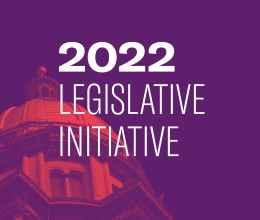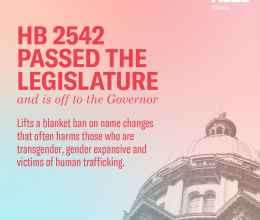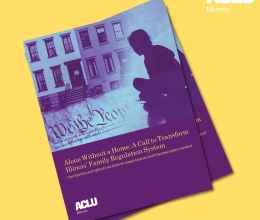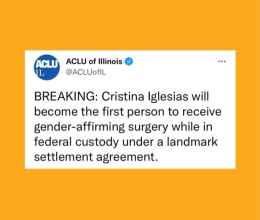Today, the Illinois Senate passed Senate Resolution 403, which calls on the Auditor General to evaluate the care provided to LGBTQ children and youth in the care of the Illinois Department of Children and Family Services (DCFS) in Illinois.
“Too many LGBTQ youth find themselves in the custody of DCFS and where they experience disapproval, discrimination or abuse. LGBTQ youth in our state have the legal right to be treated equally and to safely express their sexual orientation and gender identity. We need to make sure youth are always being placed in an affirming household and have access to culturally competent healthcare providers who can get them the health care they need,” said State Senator Julie Morrison, SR 403 sponsor.
In 2017, DCFS updated its LGBTQ policy in Appendix K to Procedures 302 in an attempt to strengthen non-discrimination protections for LGBTQ youth and promote safe and affirming environments for them, as well as require proper training for DCFS workers and caregivers on the needs of LGBTQ youth. However, since then, there has been little to no public information about its implementation or how DCFS provides oversight on the promises of Appendix K.
Senate Resolution 403 directs the Auditor General to conduct a performance audit of DCFS’s compliance with its obligations to protect and affirm LGBTQ youth in its care and the operations and management of the Department.
“LGBTQ youth are overrepresented in our child welfare system and face worse outcomes – displacement, overreliance in congregate care, harassment, and physical violence – than their heterosexual or cisgender peers. Our commitment to protecting youth in state care means we need to ensure our policies and laws are being fully implemented and enforced. We support Senate Resolution 403 and look forward to a thorough audit,” said Nora Collins-Mandeville, Director of Systems Reform Policy, ACLU of Illinois.
Per the resolution, the audit will require reporting of:
- How and with what frequency DCFS and its contractors' employees are trained on sexual orientation, gender identity, and the requirements of Appendix K
- Processes on how LGBTQ youth are matched with foster parents and actions taken by DCFS and its contractors requiring foster parents' commitment to provide care and homes that are affirming
- How youth in DCFS care are made aware of their rights and how they can report violations
- Existing oversight structure to ensure accountability and corrective actions
- Methods on how information about youth gender identity is sought and how this information is maintained and protected
- Number of transgender youth who have requested transition-related hormone therapy and consultation services, as well as the qualifications of the staff making determinations
“Right now, there is no evidence that DCFS has any systems in place to ensure workers and caregivers are abiding by these requirements. We are concerned child welfare workers who work with youth in state care often do not know about the policy or do not consult it. We need to ensure a full audit takes place so that DCFS can take the steps necessary to meaningfully implement the policy and create a system of accountability that will better protect LGBTQ youth within our state’s care,” said Nora Collins-Mandeville, Director of Systems Reform Policy, ACLU of Illinois.
Previously, the ACLU of Illinois outlined several gaps in care and accountability in Appendix K, including preventing the overreliance on more restrictive placements (like residential treatment centers) when housing LGBTQ youth and outlining clear consequences for caregivers who do anything that violates the rights of LGBTQ youth. You can read more on those concerns here.




